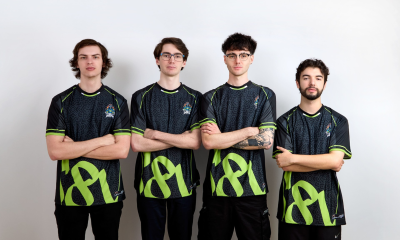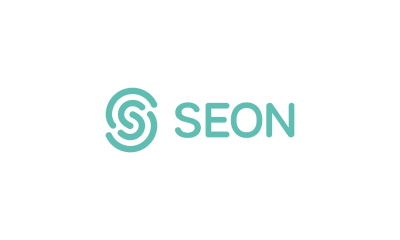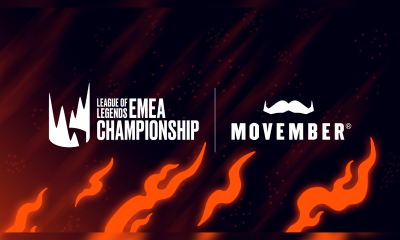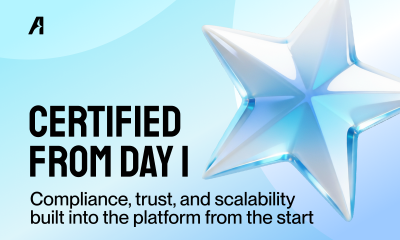Canada
New IQT Research Report: Quantum Random Number Generators will become a $7.2 Billion Market by 2026

The quantum random generator (QRNG) market will reach $ 7.2 Billion by 2026 according to IQT Research’s latest report, Quantum Random Number Generators: A Ten-year Market Assessment. This report profiles the strategies of 13 QRNG vendors and includes a detailed ten-year market forecast. The firms profiled include: Bosch, Cambridge Quantum Computing, Crypta Labs, Defense Research and Development Organization, ID Quantique, InfiniQuant, KETS, ORNL, Quantum Dice, QuintessanceLabs, Quantum Numbers, Quside, and Toshiba Europe.
More details of this report can be found at: https://www.insidequantumtechnology.com/product/quantum-random-number-generators-a-ten-year-market-assessment/
Also, at this URL those interested can request an excerpt from IQT Research’s QRNG market report. This excerpt includes all the forecast exhibits in the study (without the actual numbers), so that potential purchasers can understand better the extent and coverage of the forecasts in this report. In addition, the sample also includes an example of the analyst report that accompanies the forecast.
About the Report
QRNGs have taken on an important new role in the quantum technology business in the past year or so. They have become a key enabling technology for quantum-level security in mobile devices, data centers and even medical implants, to name just a few key areas of QRNG application. QRNGs have also provided a welcome improvement on standard RNGs, which have been used for years in scientific research and gaming.
The advent of QRNGs also provides an entry strategy for many firms into the quantum technology space. But while the QRNG market is relatively easy to enter, this creates the issue of how QRNG firms can best distinguish their offerings in the marketplace. QRNG positioning is currently being achieved through differing form factors. throughputs, chip sizes, pricing, certifiability and standards, health checks, marketing focus and more.
The report includes a quantitative ten-year forecast for QRNGs, with breakouts by form factor (chips, extension cards and standalone devices), as well as application (smartphones, IoT, finance, telecommunications, government and military, data centers, gambling, and R&D. Forecasts are provided in volume and value terms. The report also profiles 13 firms currently producing QRNGs, setting out their products, market strategies, markets targeted, financing, etc.
This report is intended for market planners and strategists at firms in the quantum technology, cybersecurity, gaming, and data communications sectors. We also believe the report will make essential reading for investors and quantum specialists at research institutes and universities. The report consists of two parts. The first part is a written analysis of the current state and future evolution of QRNGs. The second part is in the form of an Excel spreadsheet with forecasts of shipments and sales revenue of QRNGs.
From the report:
- QRNGs are a genuinely disruptive technology, bringing quantum-level security to markets at a low cost for the first time. QRNG devices also present a relatively easy way for technology firms to enter the market for quantum technologies—substantially easier than with QKD or quantum computers. However, this ease of entry into the QRNG market might make it difficult for some companies to establish sustainable profits in the QRNG space. In part because of this situation, we expect a lot of M&A activity in the coming years, with a few leaders eventually emerging
- Although quantum-secure phones are the most fashionable QRNG products, the largest market for QRNGs will be in data centers – a $3.1 billion in 2026. While all of the quantum-enabled security modalities will be applied to data center applications going forward, QRNGs will be especially useful for supplementing other forms of encryption and in low-cost customer-controlled encryption. QRNGs intended to sell into the data center market should not create significant performance penalties.
- The financial service industry worldwide is expected to show considerable interest in QRNG technology as a way to combat hackers and improve Monte Carlo simulations in portfolio valuation. Financial institutions have been among the most enthusiastic when it comes to the adoption of quantum technology. By 2026 revenues from sales of QRNGs to financial institutions will reach $2.2 billion and will come mainly in the form of standalone systems.
Powered by WPeMatico
Brooke Hilton Head of Casino at PointsBet Canada
Ezugi and PointsBet join forces to bring expanded live gaming to Ontario

Ezugi is excited to unveil a new collaboration with PointsBet, a leading iGaming operator in Canada.
As a division of Evolution since 2018, Ezugi keeps enhancing its foothold in the live gaming sector. This partnership will see Ezugi’s localized and unique live-dealer games incorporated into PointsBet’s online casino in Ontario through Evolution’s One Stop Shop (OSS) platform.
Established in Australia in 2015 and later branching into North America, PointsBet has quickly emerged as one of Ontario’s most rapidly expanding iGaming companies. Known for its cutting-edge sportsbook and growing casino offerings, PointsBet is committed to delivering an outstanding player experience, prioritizing Responsible Gaming to create a safe and secure space for every user.
Through this partnership, PointsBet Ontario customers will access Ezugi’s innovative live casino offerings, which include popular games like Canada Blackjack, EZ Baccarat, and Ultimate Roulette. These titles effortlessly integrate reliable, real-time live gaming with engaging digital elements that greatly attract North American players.
Brooke Hilton, Head of Casino at PointsBet Canada, said: “We’re excited to partner with Ezugi to bring their innovative live-dealer games to our Ontario players. This integration via Evolution’s platform enhances our casino offerings with dynamic, localised titles like Canada Blackjack and Ultimate Roulette, ensuring a premium, responsible gaming experience that aligns with our commitment to player safety and enjoyment.”
James Smith, Commercial Strategy Manager at Ezugi, said: “We are thrilled to team up with PointsBet in Ontario. We recognise Ontario as a key growth region and this partnership with a top tier operator marks an important step in our mission to bring Ezugi’s unique & exciting live casino content to the forefront for players in North America.”
The post Ezugi and PointsBet join forces to bring expanded live gaming to Ontario appeared first on Americas iGaming & Sports Betting News.
Canada
Fennica Gaming Expands its Partnership with Loto-Québec by Launching eInstant Games

Building on the momentum of its successful market entry, Fennica Gaming announced the expansion of its partnership with Loto-Québec by launching also its portfolio of eInstant games. This second phase follows the recent successful launch of Fennica Gaming’s online casino games, making its full suite of innovative online games available to players on Loto-Québec’s digital platform, the only legal online gaming offer in the province of Québec.
The launch of the eInstant portfolio completes the initial offering, delivering a diverse and engaging gaming experience designed with Fennica Gaming’s signature player-first approach. The move solidifies Fennica Gaming’s commitment to the Canadian market and its strategy of building long-term, sustainable partnerships with regulated lotteries and operators.
“Launching our casino games was the first step; following it up swiftly with our eInstants is about delivering on our promise. Our partnership with Loto-Québec is built on shared values of responsibility and providing engaging, high-quality entertainment. This isn’t just a content drop; it’s a commitment to our partner’s long-term success and to bringing fresh, reliable gaming experiences to the players in Québec,” said Joni Hovi, SVP of Customers and Marketing at Fennica Gaming.
“Our eInstants are designed with a Nordic innovativeness; they are intuitive, visually engaging, and extremely entertaining – built for sustainable fun. We’ve added the best of mobile gaming expertise, seasoned it with a high-quality, player-centric experience. We are confident that this creative energy offers a distinct flavour that will stand out and connect with players in Québec,” said Kirsi Lagus, SVP of Portfolio and Product Development.
The post Fennica Gaming Expands its Partnership with Loto-Québec by Launching eInstant Games appeared first on Americas iGaming & Sports Betting News.
Canada
CGA Announces Leadership Evolution and 2026 Board of Directors

Amanda Brewer becomes Senior Vice President of Policy & Communications and Brandon Aboultaif becomes Vice President of Western Canada; Salim Adatia (GLI) and Mike Maodus (Blake, Cassels & Graydon LLP) join the CGA Board as Scott Vanderwel (PointsBet Canada) is appointed Chair.
Amanda Brewer has joined the Canadian Gaming Association (CGA) as Senior Vice President of Policy and Communications, and Brandon Aboultaif has assumed the position of Vice President for Western Canada.
Amanda has served as a consultant to the Association for over 15 years, playing a pivotal role in achieving numerous CGA milestones. “I am confident she will apply her enthusiasm and expertise to this new position, which more precisely aligns with her ongoing contributions on behalf of our members,” said Paul Burns, President and CEO, CGA. Amanda remains actively engaged in AML and advertising bill initiatives in Ottawa, along with the Alberta consultation process, where the Association is collaborating with the Government of Alberta and AGLC to prepare the province for its iGaming market launch.
Brandon is the former Press Secretary to Dale Nally, Minister of Service Alberta and Red Tape Reduction and will be a great addition to the CGA. “With the Alberta market soon opening, it has been an important goal to expand our presence into the western part of the country,” added Mr. Burns. His key responsibilities include advancing industry research and education initiatives, supporting member engagement across Western Canada, and fostering collaboration on responsible gaming, innovation, and market development initiatives that strengthen Canada’s gaming ecosystem.
In addition, Salim Adatia, Managing Director, Canada for Gaming Laboratories International, LLC, and Mike Maodus, Partner, Blake, Cassels & Graydon LLP, have joined the CGA’s Board of Directors, and Scott Vanderwel, CEO for PointsBet Canada, becomes the Association’s new Chair.
The full 2026 board is as follows:
- Salim Adatia, Gaming Laboratories International, LLC
- Bruce Caughill, Rush Street Interactive
- Peter Czegeldy, Aird & Berlis LLP
- Neil Erlick, Nuvei
- Kurt Gissane, Aristocrat
- Charmaine Hogan, Playtech
- Dale Hooper, FanDuel
- Chuck Keeling, Great Canadian Entertainment
- Mike Maodus, Blake, Cassels & Graydon LLP
- Terry McInally, Gateway Entertainment
- Niaz Nejad, Non-Member Director
- Derek Ramm, Kinectify
- Lindsay Slader, GeoComply
- Richard Taylor, Niagara Casinos
- Shane Thompson, Konami
- Scott Vanderwel, PointsBet Canada (Chair)
- Scott Woodgate, BetMGM
We are also pleased to welcome three past chairs as Emeritus members of the board:
- Ilkim Hincer, IC360
- Carrie Kormos, CK Consulting Inc
- Bob Parente, Light & Wonder
“Amanda and Brandon have joined the CGA as full-time members to oversee several important national campaigns,” stated Scott Vanderwel, Chair of the Board. “We are also pleased to welcome Salim and Mike to the Board. The Board has worked closely with Paul over recent years to advance the Association’s leadership and board structure. We have full confidence in Amanda and Brandon as they step into these key roles, as well as in the valuable contributions that Salim and Mike are expected to bring as we prepare for an active 2026 workload.”
Mr. Burns stated that the newly announced executive and Board appointments will strengthen CGA’s position and support its expansion into Western Canada. “Amanda brings extensive CGA experience, while Brandon contributes knowledge of government policy at both federal and provincial levels. Coupled with our enhanced Board, I am confident they will help drive CGA’s objectives and ongoing growth.”
Source: canadiangaming.ca
The post CGA Announces Leadership Evolution and 2026 Board of Directors appeared first on Americas iGaming & Sports Betting News.
-

 AI4 days ago
AI4 days agoPrimero Games Uses XGENIA for Their First AI-Generated Slot Game
-

 Balkans5 days ago
Balkans5 days agoKiril Kirilov takes on new leadership role at CT Interactive
-

 Baltic Tech Week4 days ago
Baltic Tech Week4 days agoHIPTHER Baltics Announces Riga Event and Strategic Partnership with LexLegas
-

 ALGS 2026 Championship4 days ago
ALGS 2026 Championship4 days agoS8UL Esports secures historic top five finish at ALGS 2026 Championship; bags INR 1 crore in prize money
-

 Compliance Updates5 days ago
Compliance Updates5 days agoSEON Launches Identity Verification Built on Real-Time Fraud Intelligence
-

 College Sport Prediction Markets5 days ago
College Sport Prediction Markets5 days agoNCAA Urges CFTC to Suspend College Sport Prediction Markets
-

 EMEA ESPORTS3 days ago
EMEA ESPORTS3 days agoMOVEMBER TEAMS UP WITH RIOT GAMES EMEA ESPORTS
-

 Latest News4 days ago
Latest News4 days agoCertified Platforms: Why Operators Choose Them Early



















